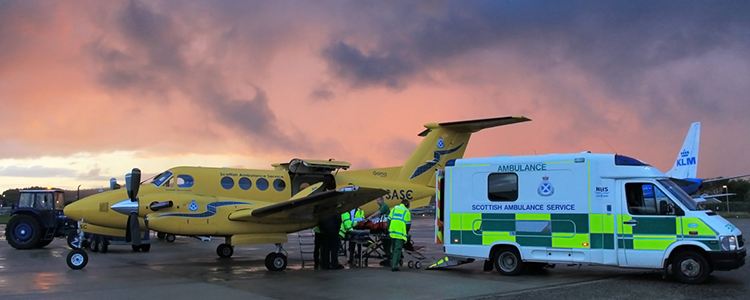Celebrating the pioneers in rural and remote health credentialling

Celebrating the pioneers in rural and remote health credentialling
In a significant step for healthcare in rural and remote areas, NES has announced the first awards of the General Medical Council (GMC)-approved Credential in Rural and Remote Health (Unscheduled and Urgent Care). Seven UK medics are recipients.
This recognition marks a key milestone in addressing the ongoing need for skilled healthcare professionals able to provide immediate care in environments where resources and access to acute care may be limited.
Six doctors practice in Scotland, four within NHS Highland, one in Dumfries and Galloway, one in NHS Shetland and the seventh doctor with NHS England, the first in England to receive the credential award.
Professor Emma Watson, Medical Director, NES, said:
“We’re absolutely delighted with this outcome and extremely proud to have seven doctors awarded the Credential in Rural and Remote Health (Unscheduled and Urgent Care). The doctors themselves are extremely happy with this recognition.
“It is the first of the three GMC-approved credentials in the UK to make awards. Its impact on the rural workforce and the sustainability of healthcare delivery in rural communities in Scotland is significant. We look forward to more applications from doctors interested in credentialling.”
The GMC-approved credential not only acknowledges these doctors’ exceptional expertise in looking after people requiring unscheduled and urgent care, it also highlights their commitment to improving patient outcomes in rural and remote communities.
Dr Pauline Wilson, Associate Postgraduate Dean, NES, said:
“Congratulations to the first seven doctors awarded the GMC-approved Credential in Rural and Remote Health (Unscheduled and Urgent Care). Your expertise, dedication, and service to rural and remote communities is truly inspiring. We look forward to seeing the lasting impact you will continue to make in the lives of patients who need it most.”
What is the GMC-approved Credential in Rural and Remote Health (Unscheduled and Urgent Care)?
The credential, developed by NES, provides quality-assured learning, equipping doctors, assuring employers and benefitting rural communities.
The GMC-approved credential recognises doctors who have demonstrated the knowledge, skills, and practical experience necessary to manage medical emergencies and urgent care situations.
It sets a new standard for healthcare delivery in settings where the unpredictability of patient needs and limited access to immediate care are constant realities. For those working in rural or remote environments, it ensures that medical professionals have the necessary knowledge and skills to support urgent and unscheduled patient care and can provide the healthcare their communities so desperately need.
Why Does It Matter?
For patients living in remote and rural areas, time is often a critical factor in their treatment, whether they are dealing with a sudden medical emergency, a chronic condition, or an unplanned health issue. Doctors who hold the GMC-approved Credential in Rural and Remote Health play an essential role in ensuring that these patients receive timely and appropriate medical attention. Credentialing supports a flexible and capable healthcare workforce, improves continuity of care, and helps address health disparities by providing essential services that might otherwise be unavailable.
Looking Ahead
The success of these first seven doctors in obtaining the Credential in Rural and Remote Health represents the beginning of a new era for healthcare in rural and remote communities.
The impact of this credential goes beyond individual achievements - it is about creating a healthcare workforce equipped and ready to meet the unique challenges of rural and remote care. As these doctors continue to serve their communities, they will also mentor future generations of healthcare professionals, ensuring that this vital work continues for years to come.
Interested in finding out more?
There are two routes for the Credential:
- Recognition Route – Doctors currently working within the scope of the credential and seeking recognition as credential holders will, where possible, submit evidence rather than complete further training in the workplace. This approach is both flexible and proportionate for doctors delivering service. This route is open for applications.
- Learner Route – Doctors entering the credential learning route will undertake an initial capability assessment to align their learning needs to the curriculum. Learning needs will vary according to previous experience. Applications for this route open in late Summer 2025.
For more details visit Turas, the workforce learning platform by NES. Or contact the credential team by emailing nes.ruralremotecredential@nhs.scot.
Contact: corpcomms@nes.scot.nhs.uk
December, 12 2024
